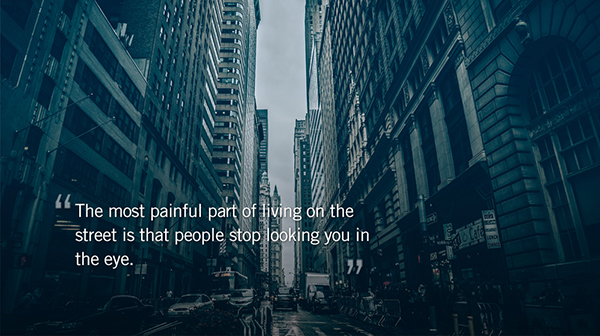
Peter directed his gaze at [the crippled man], as did John, and said, “Look at us.” —Acts 3.4
The Sunshine Hotel opened in 1922 on the Bowery in lower Manhattan. At $4.50 a night the flop house has given tens of thousands of men a four foot by six foot room, crowned with a chickenwire ceiling, and a cot. Many of the men struggle with addiction, isolation, and a host of pain — but each has a story worth hearing.
For years a raspy-voiced man named Nathan Smith sat inside the metal caged reception room at the Sunshine. Smith cared deeply for the men, helping them find jobs, homes, and treatment programs. “He saw a lot of beauty there that a lot of us couldn’t see,” his daughter said when Smith passed away in 2002.
The hotel’s sign was removed years ago and there are fewer rooms available, but there are still full-time residents. It can be easy to miss the faces of these men today, the Sunshine now is eclipsed by a high-end grocer and a $50 million art museum.
Homeless people regularly say the most painful part of living on the street is that other people stop looking them in the eye. It was the same in Acts 3. Peter has to ask a beggar to look at him. Hundreds are streaming by, a few toss some money in his cup to assuage their guilt of not caring. Peter wants to connect.
It is a profound act of faith to discover another person’s humanity — draw it to the front of the conversation — it’s also the context for miraculous things to happen. Faith is always cultivated in the context of relationship.
This year a group of young professional New Yorkers started visiting the Sunshine Hotel to document the stories of the men they found there. Operating under the name Hear the Hungry, the group says, “We aim to create a moving portrait of the human condition.”
It is the work of the church to extend our time, energy, and effort to the marginalized and oppressed, but it starts with listening. Hear the Hungry asks, “What can we do as a society to lift up our neighbors and help seal the cracks that these people fell through?” It is the faith to ask questions, and the courage to reorient our lives in response to what we learn, that brings the gospel to life.
Today’s Readings
Joshua 23 (Listen – 2:31)
Acts 3 (Listen – 3:33)



